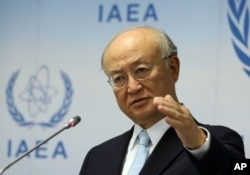The U.N. nuclear agency has officially closed its more than decade-old investigation into allegations Iran once worked to develop nuclear weapons.
The International Atomic Energy Agency unanimously approved a resolution to end the investigation.
The approval Tuesday came after IAEA chief Yukiya Amano presented his final report on the matter.
He said the conclusion was that Iran carried out activities related to developing a "nuclear explosive device," mostly before 2003. But those activities did not get beyond scientific studies and acquiring "certain relevant technical competencies and capabilities."
U.S. Secretary of State John Kerry welcomed the end of the investigation, saying it will in not prevent the agency from investigating if there is reason to believe Iran is pursuing covert nuclear activities.
Meanwhile, U.N. experts have concluded that Iran violated a U.N. resolution when it fired a ballistic missile in October, a move that could lead to sanctions.
The United States, Britain, France and Germany had asked the U.N. Security Council sanctions committee to investigate the missile launch. A report issued by the United Nations panel supported the contention by the four countries that the launch violated U.N. sanctions.
A U.N. resolution prohibits Iran from launching ballistic missiles capable of delivering nuclear weapons.
At the time of the launch, Iranian Foreign Minister Mohammad Javad Zarif denied that the missile was capable of carrying a nuclear warhead.
Iran has long insisted its nuclear program is for peaceful purposes and not directed at creating weapons.
In July, Iran reached an agreement with the United States, Britain, China, France, Russia and Germany to curb its nuclear activity in exchange for much-needed sanctions relief.
Part of that deal is the IAEA ending its investigation and certifying Iran's cooperation before the sanctions placed on Iran because of its alleged nuclear activity will be lifted.






